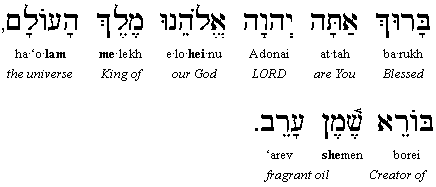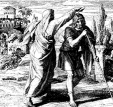|
|
|||||||||||||||||||||||
 |
|||||||||||||||||||||||
|
Learn Hebrew |
|||||||||||||||||||||||
 |
|||||||||||||||||||||||
|
Blessings Book |
|||||||||||||||||||||||
|
The act of anointing signified consecration to a holy or sacred use, as the act of anointing the Kohen Gadol (high priest; Exodus 29:29; Leviticus 4:3) and the sacred vessels of the mishkan (Tabernacle; Exodus 30:26) demonstrate. The High Priest and the King are called “the anointed” (Leviticus 4:3,5,16; 6:20; Psalms 132:10), and anointing was considered to be a sort of coronation (1 Samuel 16:13; 2 Samuel 2:4, etc.). Prophets were also said to be anointed (1 Kings 19:16; 1 Chronicles 16:22; Psalms 105:15). Yeshua Himself, as the greatest High Priest, King, and Prophet, is called the “Anointed One” or Messiah (Psalms 2:2; Daniel 9:25,26, John 1:41; Acts 9:22; 17:2,3; 18:5, 28). |
 |
||||||||||||||||||
 |
||||||||||||||||||
|
Blessed are Thou, LORD our God, King of the universe, |
||||||||||||||||||
|
Transliterated: |
||||||||||||||||||
 |
||||||||||||||||||
|
Barukh attah Adonai eloheinu melekh ha-olam, |
||||||||||||||||||
|
Hebrew for Christians |
||||||||||||||||||
|
||||||||||||||||||
